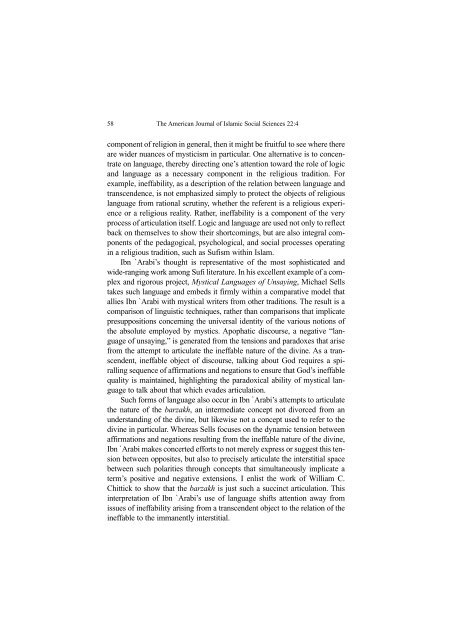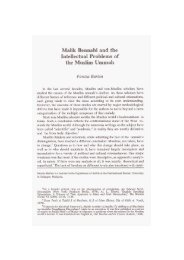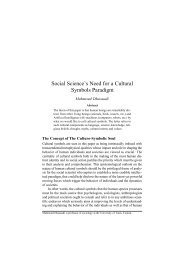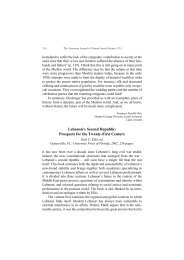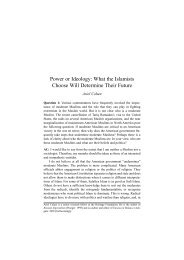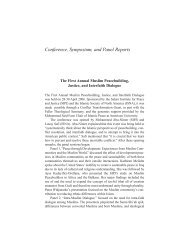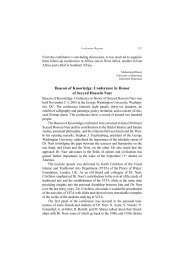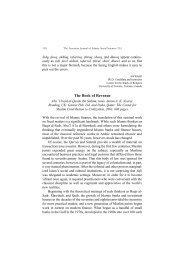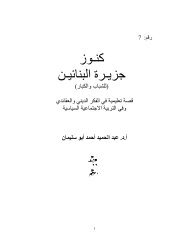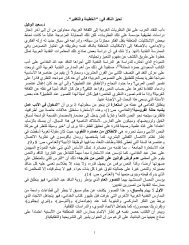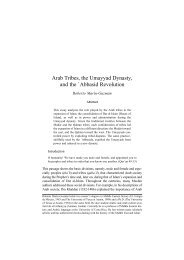Vagueness: An Additional Nuance in the ... - I-Epistemology
Vagueness: An Additional Nuance in the ... - I-Epistemology
Vagueness: An Additional Nuance in the ... - I-Epistemology
You also want an ePaper? Increase the reach of your titles
YUMPU automatically turns print PDFs into web optimized ePapers that Google loves.
58 The American Journal of Islamic Social Sciences 22:4<br />
component of religion <strong>in</strong> general, <strong>the</strong>n it might be fruitful to see where <strong>the</strong>re<br />
are wider nuances of mysticism <strong>in</strong> particular. One alternative is to concentrate<br />
on language, <strong>the</strong>reby direct<strong>in</strong>g one’s attention toward <strong>the</strong> role of logic<br />
and language as a necessary component <strong>in</strong> <strong>the</strong> religious tradition. For<br />
example, <strong>in</strong>effability, as a description of <strong>the</strong> relation between language and<br />
transcendence, is not emphasized simply to protect <strong>the</strong> objects of religious<br />
language from rational scrut<strong>in</strong>y, whe<strong>the</strong>r <strong>the</strong> referent is a religious experience<br />
or a religious reality. Ra<strong>the</strong>r, <strong>in</strong>effability is a component of <strong>the</strong> very<br />
process of articulation itself. Logic and language are used not only to reflect<br />
back on <strong>the</strong>mselves to show <strong>the</strong>ir shortcom<strong>in</strong>gs, but are also <strong>in</strong>tegral components<br />
of <strong>the</strong> pedagogical, psychological, and social processes operat<strong>in</strong>g<br />
<strong>in</strong> a religious tradition, such as Sufism with<strong>in</strong> Islam.<br />
Ibn `Arabi’s thought is representative of <strong>the</strong> most sophisticated and<br />
wide-rang<strong>in</strong>g work among Sufi literature. In his excellent example of a complex<br />
and rigorous project, Mystical Languages of Unsay<strong>in</strong>g, Michael Sells<br />
takes such language and embeds it firmly with<strong>in</strong> a comparative model that<br />
allies Ibn `Arabi with mystical writers from o<strong>the</strong>r traditions. The result is a<br />
comparison of l<strong>in</strong>guistic techniques, ra<strong>the</strong>r than comparisons that implicate<br />
presuppositions concern<strong>in</strong>g <strong>the</strong> universal identity of <strong>the</strong> various notions of<br />
<strong>the</strong> absolute employed by mystics. Apophatic discourse, a negative “language<br />
of unsay<strong>in</strong>g,” is generated from <strong>the</strong> tensions and paradoxes that arise<br />
from <strong>the</strong> attempt to articulate <strong>the</strong> <strong>in</strong>effable nature of <strong>the</strong> div<strong>in</strong>e. As a transcendent,<br />
<strong>in</strong>effable object of discourse, talk<strong>in</strong>g about God requires a spirall<strong>in</strong>g<br />
sequence of affirmations and negations to ensure that God’s <strong>in</strong>effable<br />
quality is ma<strong>in</strong>ta<strong>in</strong>ed, highlight<strong>in</strong>g <strong>the</strong> paradoxical ability of mystical language<br />
to talk about that which evades articulation.<br />
Such forms of language also occur <strong>in</strong> Ibn `Arabi’s attempts to articulate<br />
<strong>the</strong> nature of <strong>the</strong> barzakh, an <strong>in</strong>termediate concept not divorced from an<br />
understand<strong>in</strong>g of <strong>the</strong> div<strong>in</strong>e, but likewise not a concept used to refer to <strong>the</strong><br />
div<strong>in</strong>e <strong>in</strong> particular. Whereas Sells focuses on <strong>the</strong> dynamic tension between<br />
affirmations and negations result<strong>in</strong>g from <strong>the</strong> <strong>in</strong>effable nature of <strong>the</strong> div<strong>in</strong>e,<br />
Ibn `Arabi makes concerted efforts to not merely express or suggest this tension<br />
between opposites, but also to precisely articulate <strong>the</strong> <strong>in</strong>terstitial space<br />
between such polarities through concepts that simultaneously implicate a<br />
term’s positive and negative extensions. I enlist <strong>the</strong> work of William C.<br />
Chittick to show that <strong>the</strong> barzakh is just such a succ<strong>in</strong>ct articulation. This<br />
<strong>in</strong>terpretation of Ibn `Arabi’s use of language shifts attention away from<br />
issues of <strong>in</strong>effability aris<strong>in</strong>g from a transcendent object to <strong>the</strong> relation of <strong>the</strong><br />
<strong>in</strong>effable to <strong>the</strong> immanently <strong>in</strong>terstitial.


